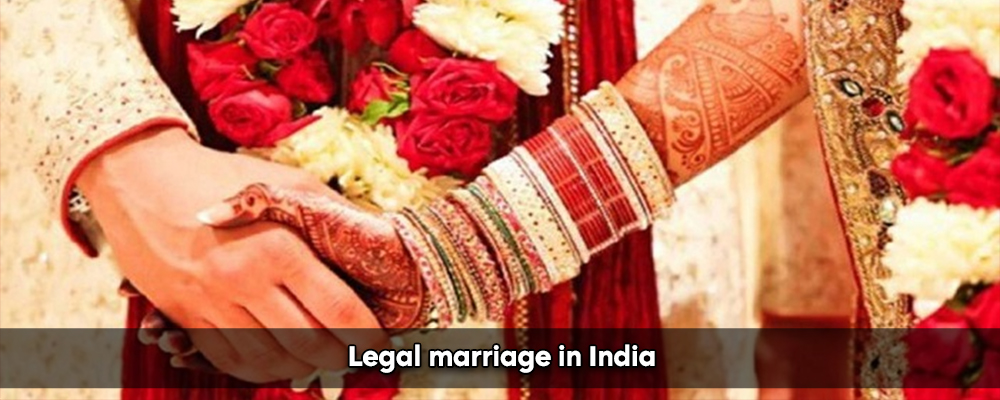Owing to the country’s vast religious and cultural variety, marriages in India are complex and multifaceted concepts. A “legal marriage” is one that is approved by Indian law, which is typically based on the national population’s religious practices, beliefs, and traditions. In order to put the requirements and requirements set forth by the laws and customs into effect, it is crucial that the parties solemnize and register their marriage.
India’s Recognized Marriage: Its Types
- A comprehensive law that regulates weddings between Hindus, Buddhists, Jains, and Sikhs is the Hindu Marriage Act. It describes the prerequisites for a legally binding Hindu marriage, such as the parties’ eligibility, the existence of a solemnizing authority, and the requirement for ceremonies.
- Irrespective of the spouses’ different religions, the Special Marriage Act establishes a legal foundation for marriages. It enables people to register and formally validate their union, regardless of their choice for a civil ceremony or another religion.
- The Muslim Personal Law, which acknowledges the legality of marriage through a contract (Nikah), governs Muslim marriages in India. This legislation establishes criteria for marriage, divorce, and maintenance while also honouring the variety within the Muslim community.
- The Christian Marriage Act in India establishes guidelines for Christians getting married and becoming legally wed. A priest or minister must perform the ceremony, and in order for the marriage to be enforceable, registration is required.
Need A Legal Advice
The internet is not a lawyer and neither are you. Talk to a real lawyer about your legal issue

Prerequisites for a Valid Marriage
- The free and legitimate consent of both parties is essential to the idea of a lawful marriage. Consent must be given voluntarily, free from fraud or pressure. Any marriage that is entered into without the sincere consent of both parties could be declared void.
- The acceptable age of marriage in India is 18 for women and 21 for men. Minor marriages are null and void, and those who arrange or coerce such weddings face harsh consequences.
- Some partnerships are forbidden from marriage because they are deemed incestuous. Marriages that take place within the parameters set forth by the Hindu Marriage Act are null and void from the beginning.
Marriage Registration: Its Importance and Procedure
- Even though it’s not required for every marriage, registration has important legal ramifications. In addition to offering legal recognition, a registered marriage guarantees the preservation of spousal rights and streamlines the process of acquiring legal documentation.
- While state-by-state variations exist, most marriage registration processes entail completing an application, bringing the required paperwork, and going to the registration office. Particular emphasis is placed on the significance of registration for civil and interfaith marriages under the Special Marriage Act.
Legal Obligations and Rights for Spouses
- There are legal procedures in place to protect the financially dependent spouse in the case of a divorce. A number of variables, including the recipient’s requirements and the financial situation of both spouses, influence the amount of maintenance or alimony awarded.
- The division of property upon a spouse’s death is governed by the Hindu Succession Act and other pertinent legislation. The law grants widows and widowers the right to inherit their deceased spouse’s assets.
- The child’s welfare is the most important factor to take into account in divorce situations. In determining custody arrangements, the court considers the child’s best interests, accounting for the child’s age and preferences, among other things.
Obstacles and Changes
- India is debating the prospect of a Uniform Civil Code, which would provide all people with a single set of laws governing personal concerns like marriage, divorce, and inheritance. The discussion centres on striking a balance between upholding gender justice and equality and honouring various cultural customs.
- Even if the legal system is changing, same-sex marriage recognition is still a divisive topic. Advocates for inclusivity persist in their stance, contending that depriving same-sex couples of legal recognition constitutes an infringement on their basic rights.
For those traveling the matrimonial route amid the intricate web of Indian culture and law, knowing the legal subtleties of marriage is essential.
Lawyers’ assistance will be required for the court marriage. If you want to have your court marriage in Delhi, you can get assistance from court marriage lawyers in Delhi.
One can talk to lawyers from Lead India for any kind of legal support. In India, free legal advice online can be obtained at Lead India. Along with receiving free legal advice online, one can also ask questions to the experts online free through Lead India.





 Talk to a Lawyer
Talk to a Lawyer